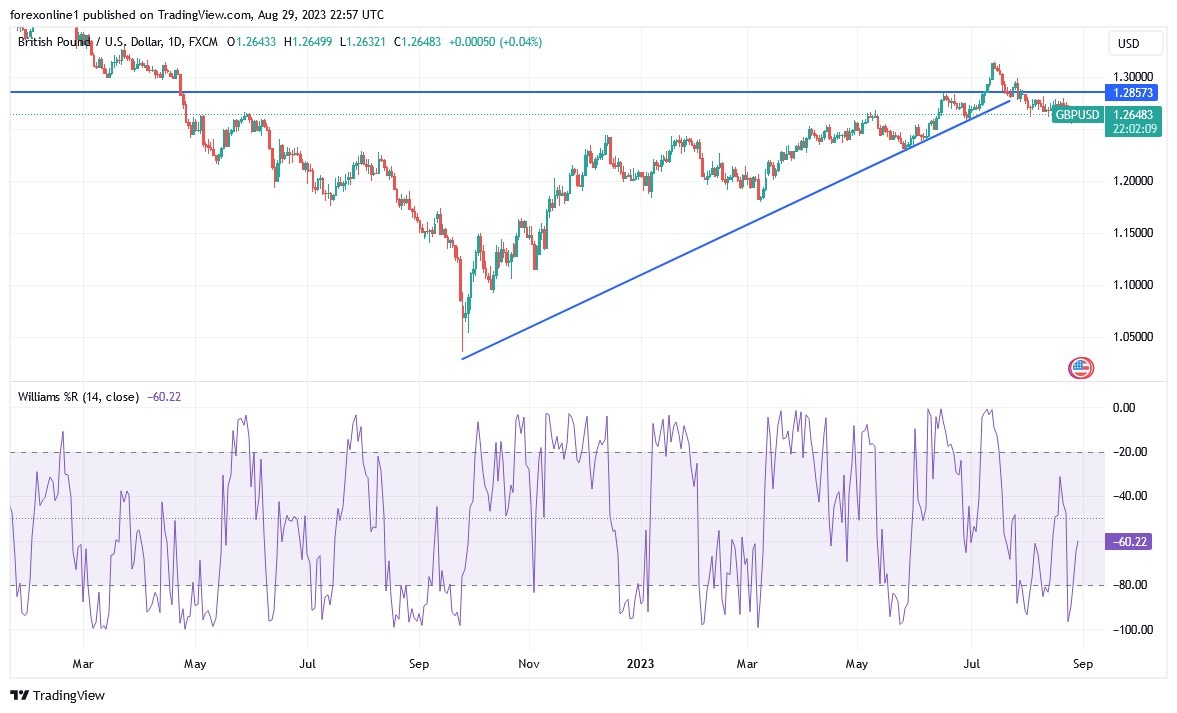[ad_1]
Despite a temporary halt to the gains of the US dollar, the upward rebound of the GBP/USD currency pair is still limited and did not exceed the level of 1.2655, which was stable near it at the beginning of today’s session on Wednesday. The rebound came after the sterling/dollar pair fell to the 1.2547 support level, its lowest in more than two months. The performance confirms the extent of the negative pressures on sterling’s performance. During the Jackson Hole seminar Ben Broadbent, deputy governor of the Bank of England, agreed that supply shocks were a major concern, noting that geopolitical issues such as the war between Russia and Ukraine and rising food and energy prices exacerbated the crisis.
Forex Brokers We Recommend in Your Region
See full brokers list
It is unclear what the ongoing geopolitical effects may be but monetary policy is likely to remain elevated for the foreseeable future. Increasing geopolitical frictions in 2023 may contribute to continued inflation in open economies that tend to rely on international trade, also requiring higher interest rates for a longer period to achieve price stability.
In addition to Lagarde’s views on supply shocks, Broadbent pointed out that the ongoing imbalance in the supply and demand for goods that was embodied during the pandemic is not only due to disrupted supply chains but also to demand inflation as consumers received unprecedented help to protect salaries.
In relation to Broadbent’s comments about the importance of demand, the Federal Reserve Bank of San Francisco found that the general public in the United States was able to build up a $2.1 trillion reserve of excess savings amid the pandemic. However, the large additional consumption has now reduced accumulated savings to $500 billion.
Despite the big drop, the U.S. Federal Reserve expects that amount to support the consumer side of the economy at least through the fourth quarter of 2023. These additional savings may be a key factor in explaining why the U.S. economy remains so resilient amid unprecedented tightening.
US Federal Reserve Governor Powell indicated that tight monetary policy must continue, while economic growth remained too resilient to sustainably return to 2% levels. Despite raising interest rates by 300 basis points since the last edition of the Jackson Hole Conference, US quarterly GDP growth has increased over the past two reports.
Only recession is capable of taming inflation in the West, as the UK Chancellor says. For her part, Karen Ward, the strategic expert at JPMorgan Asset Management, said that Western economies may not be able to escape inflation without recession because their labor markets are still very tight.
Speaking on Bloomberg TV on Tuesday, former Bank of England economist and adviser to British Treasury Secretary Jeremy Hunt said such an outcome was likely because policymakers would need to keep borrowing costs high. She told Francine Laqua: “The markets have bought into the idea that we can have resilient growth throughout the West, yet all inflationary pressures will disappear on their own, and central banks can move from tightening to easing.” And “Unfortunately, I think it will require this weakness.”
This conclusion was supported by Ward’s comments at the US central bank’s Jackson Hole meeting last week, where officials, including Federal Reserve Chairman Jerome Powell, stressed the need to maintain tight monetary policy. where he stated, “The message from everyone in different ways is that we are not confident of accomplishing the task, and we are not confident that we are heading sustainably towards 2%.” And “until it becomes really clear that the activity eases the labor market, and that wage pressures recede, we cannot be convinced that we have returned to 2%.” And this leaves us in a higher world for a longer time.
While European Central Bank President Christine Lagarde and Powell offered little evidence of their next steps in their upcoming decisions, each pointed to continued concerns about prices. Where she said: “Both sides are very concerned about the inflationary pressures that still stem from the labor market, and recording low unemployment rates, and therefore wage growth remaining high – and as Lagarde called it, mutual inflation.” “I think that’s absolutely true.”
She added that the markets have not yet fully adjusted to the expectations of higher interest rates in the long term, and that her surprise last week after pessimistic business surveys pointed to economic weakness confirms this.
- The general trend of the GBP/USD currency pair is still downward.
- There will be no reversal of the trend without moving towards the 1.3000 psychological resistance level.
- This requires the bulls to break the 1.2820 resistance first.
- Until now, the US dollar is still the strongest from the future of the American interest rate.
The US jobs numbers will have the final word on the future performance of the US dollar. Today the currency pair will be affected by the announcement of the ADP reading to measure the change in American non-agricultural jobs and the reading of the gross domestic product growth rate for the United States.
Ready to trade our Forex daily analysis and predictions? Here are the best forex trading platforms UK to choose from.

[ad_2]